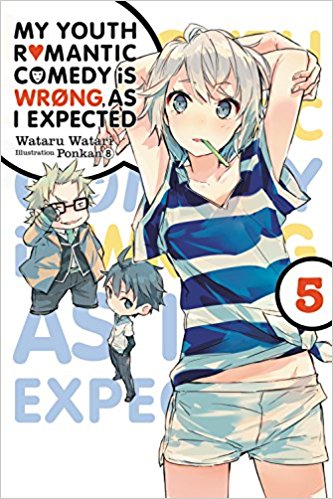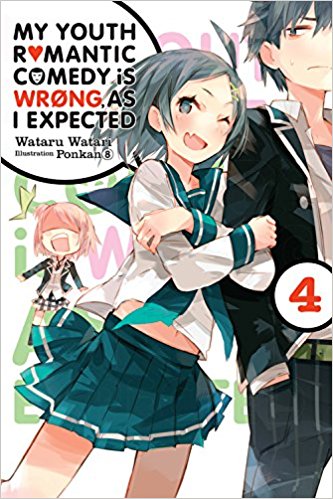By Wataru Watari and Ponkan 8. Released in Japan as “Yahari Ore no Seishun Rabukome wa Machigatte Iru” by Shogakukan. Released in North America by Yen On. Translated by Jennifer Ward.
This volume was pushed back a month or two, and when it finally did come out I didn’t have the time to read it except in short chunks. This is probably one of the reasons that I feel so exhausted after reading it, but the other is the subject matter. For a book that’s supposed to be a “romantic comedy”, which does have a generous helping of humor, it can be extremely depressing. It doesn’t help that this is exactly what the author is going for – after yet another problem is solved by Hachiman getting everyone to unite in hating him (and thus supporting the girl with the problem), his teacher reminds him that while Hachiman may not care about everyone’s bad feelings, there are others that worry about him. This includes her, as well as Yukino and Yui, but learning this lesson is, I think, going to take a few more volumes. Meaning that I may still be glum about this humorous series.
The subject of the book is the school’s Cultural Festival. Hachiman’s class is putting on a production of The Little Prince, which is not BL despite the best efforts of its adapter. Hachiman himself is on the festival committee, despite his best efforts, in the “Records and Miscellaneous” department, which rapidly becomes “defer everything we don’t want to do to here”. The supposed Festival Chairman is Sagami, a young woman with confidence issues who tries to get herself back in the “cool kids” group by taking this on, but in reality everything is being done by the vice-chairman, Yukino, almost to her physical and mental detriment, because since the chairman is flaking on things, everyone else decides to flake as well. And there’s also Yukino’s older sister lurking around the festival, making things worse in the way that only family can. Is this festival really going to be OK?
Well, yes, it pretty much is. There are no major festival disasters on this watch, mostly as Yukino is very good at organization (delegation, not so much). We are gradually seeing her warm up to a few people, particularly Yui, who remains the bright ball of sunshine in this series despite not having all that much to do in this book. The trouble, of course, is Hachiman, who once again narrates the book in a jaded, cynical and otaku-ish tone that serves to belie the fact that he really does care about these people and, when push comes to shove, wants to help them. But because of his self-image, he feels that it’s fine to solve a problem by throwing himself under the bus. Which is ironic, given how our three leads’ lives interacted at the start of the series. Despite being reminded that there are people who value him, the book ends with Yui taking a reluctant Yukino to the after party, while Hachiman resolutely doesn’t go.
I realize that once Hachiman learns from his past mistakes, we’re reaching the end of the series. And this is still very well written with interesting characters I want to see succeed. But man, it’s a slog, and right now I don’t really want either Yukino *or* Yui to end up with Hachiman. (There is a yuri fandom for it, right?) Definitely recommended for fans of the series, however.





